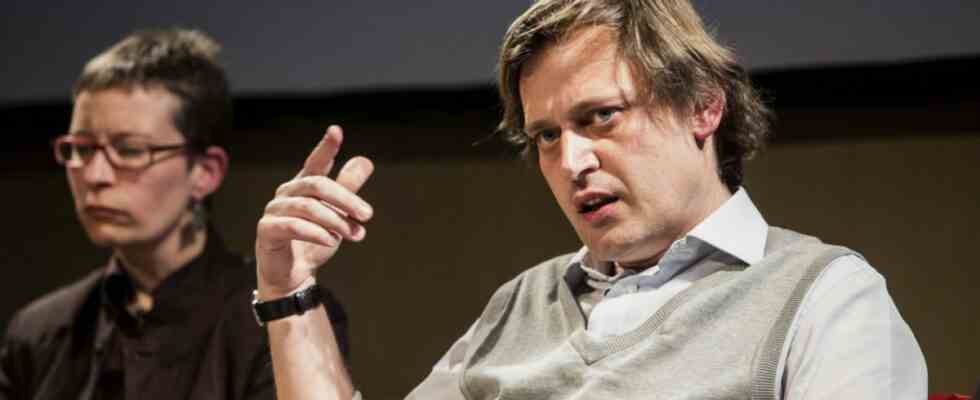The fact that the “Meridian” poetry festival took place in Chernivtsi this year is news in itself. “For the Ukrainian Armed Forces” was written in large letters on the program poster. Everything was marked by the war. Jurko Prochasko, the well-known Lviv intellectual who follows the Galician tradition of multiculturalism, said: “I never lose my consciousness of this war and its pitiless reality for a moment”, and so it was with everyone involved. All thoughts and feelings are absorbed and permeated by the war, as a Ukrainian writer one cannot concentrate on anything else, the usual works – literary essays, translations, poems – are left behind.
Most of them didn’t write anything after the Russian invasion. Slowly, however, the new experiences became an issue, and that was clearly felt at this meeting. Something categorically new is beginning: Irena Karpa spoke of her “paralysis” and the realization that she now has to “get involved” in the war, Kateryna Kalytko took the military threat directly into her metaphors, in which the armored tracks literally penetrate the body’s feeling seem to be. It was very touching that Iryna Tsilyk spoke of not forgetting the longing for a “good life” right now. Her husband Artem Tschech is at war and has just had two days of leave from the front. When Jurko Prochasko said, “He has very sad eyes,” it was one of those moments that you won’t soon forget.
At the three-day event, the items on the program were crowded and it was noticeable how young the audience was. Chernivtsi is a university town, the old Habsburg border region has so far been spared from the war, but literature sees itself drawn into barbaric topicality. Sviatoslav Pomerantsev, the festival’s founder, spoke about the military concept of the “backcountry” as a human and economic resource for the army. But poetry is also “a resource of steadfastness, joie de vivre and hope.”
“What disasters do your heroes deal with?”
You could experience this in Chernivtsi in many different and initially irritating ways. The exclamation “Slava Ukrajini” originating from the liberation movements at the end of the official speeches (“Glory to the Ukraine”) and the response from the audience “Slava Heroyam” (“Glory to the Heroes”) were part of it, and it was so militarily strange for Westerners Foreigners may except: This is now an act of self-understanding, the assurance of a new Ukrainian identity. And this sees itself primarily as an alternative to Russian imperialism. “Ukrainian nationalism,” as one learned here, is a term that is primarily used by Russian propaganda and that should be viewed in a very differentiated manner.
Although there are clearly nationalist currents in Ukraine, something else is dominant, especially in the cultural sector: a return to the tradition of multilingualism and the coexistence of different language communities in the same area. Authors from Israel have always been deliberately invited to “Meridian” in recent years, as a link to the Jewish history of Chernivtsi, as is the case this year. And given the anti-Semitic attitudes of Ukraine’s past, one should not underestimate how Chernivtsi presents itself in official brochures: as a city that “always wanted to be tolerant and open-hearted to all nations and denominations.” Ukraine’s efforts to counter Russian imperialism in terms of content should be taken seriously. When the German literary historian is asked by a journalist from Kyiv: “What catastrophes are your heroes dealing with?” – then, despite all the confusion, it is primarily to be understood as an attempt at rapprochement, of mutual understanding. But of course you also notice from such formulations which hurdles have to be overcome.
The war has unleashed something entirely contrary to Putin’s intentions
Ukrainian literature faces the challenge of breaking free from the shadow of Russian language and culture. Breaking down these structures that have been built up over centuries has been the dominant theme since the Russian invasion, and every conversation in Chernivtsi inevitably touched on this point. Ukrainian as the language of the “dumbass” and “peasants”, the Ukrainians as “Little Russians” – even with the great Russian writers such as Tolstoy and Pushkin, this imperialist claim of Russia is conveyed quite naturally. Communicating how to deal with Russian culture is currently the most sensitive topic for Ukrainians when talking to Western authors: creating awareness that Ukraine must not be perceived politically and culturally as a kind of Russian branch. For example, the Ukrainian language has more points of contact with Slovak and Polish than with Russian.
So one could get the impression, and this is the most important finding, at the “Meridian” meeting that Putin’s war primarily triggered something that completely contradicts his intentions. The Ukrainians, although they unmistakably still live in a post-Soviet society and differ greatly from Western countries, are sharpening their own identity with great self-confidence. This can hardly be undone.

